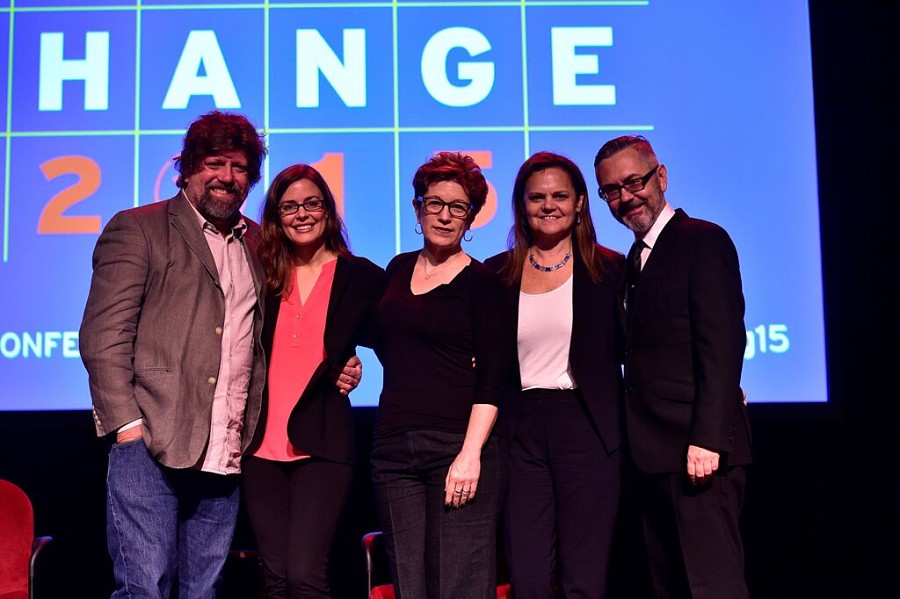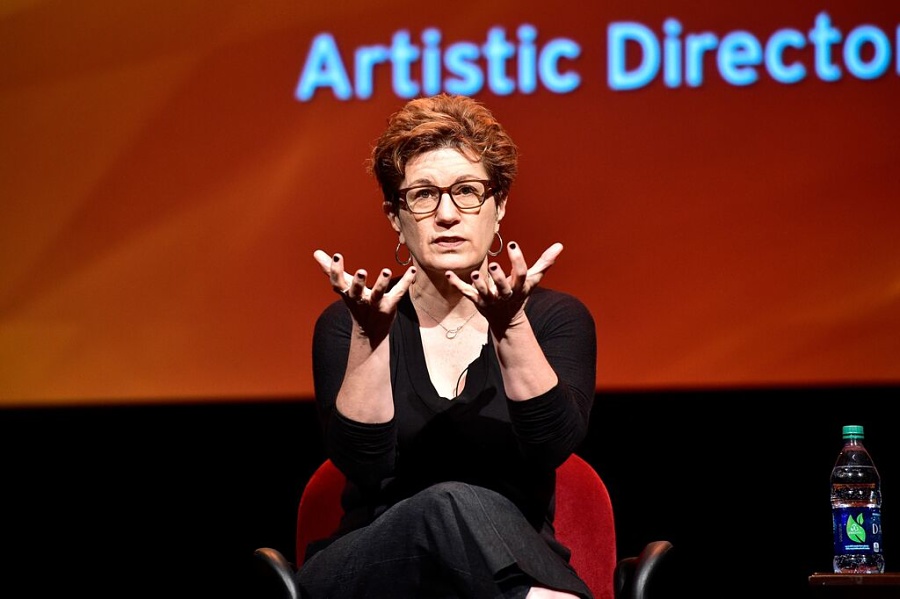CLEVELAND: The second morning of Theatre Communications Group’s 2015 National Conference went from macro to micro and back with breathtaking speed, kicking off with comments about access to the arts writ large, and concluding with a deep dive into the craft of theatremaking theatre, which swelled into a discussion of the essence of liveness and human consciousness. Heady stuff for a Friday before brunch time, but TCG attendees were happy to go there.
After a brief shtick in which TCG managing director Kevin Moore and Cleveland Play House managing director Kevin Moore play-acted a conflict over which of them was supposed to speak—both did, eventually—the podium was handed to Jane Chu, chairman of the National Endowment for the Arts.
Chu spoke about her background as an Oklahoman raised by Chinese immigrants who discovered that playing music as a child could provide a powerful outlet of expression, no matter who she was or where she lived. She talked about theatre in similar terms, calling it “an art form that acts out the stories of our lives and dreams, our hopes and our communities. At the heart of it is universal human emotion that transcends race, income, and geography. It’s so powerful to see ourselves reflected onstage and know we are not alone in our experiences.”
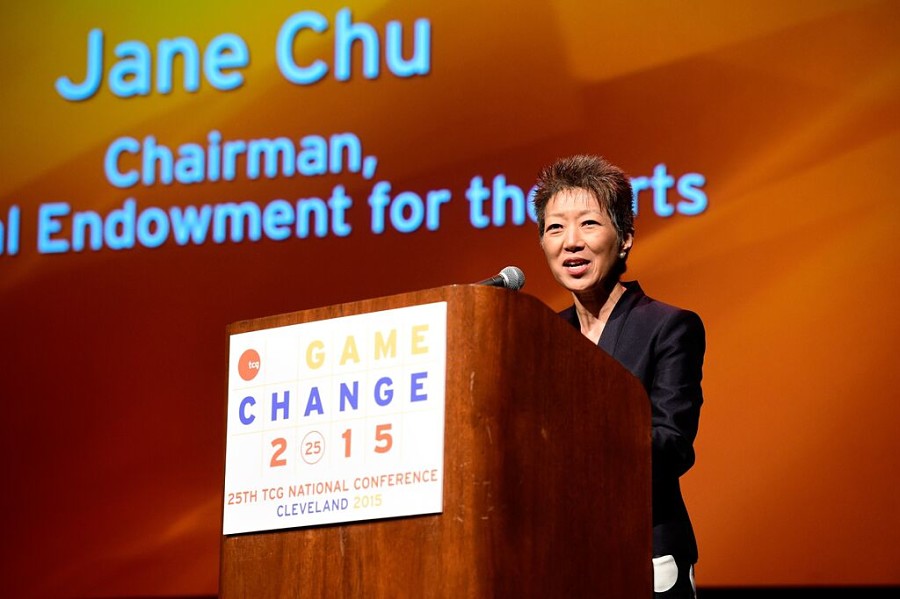
She also emphasized a diversity of options as an asset for the arts, including theatre. “The great thing about the arts is that not everyone is interested in the same thing, but there is something for everyone,” Chu said. “We need to look for the access points that allow people to feel the arts belong to them.”
One artist who’s all about a radically egalitarian, open-access approach to theatre, Lear deBessonet, was then presented with the Peter Zeisler Memorial Award. DeBessonet is head of the Public Theater’s Public Works program, which stages an annual pageant-style adaptation of a classic as part of the Shakespeare in the Park series, drawing its huge cast and crew from New York City community members and organizations. She’s even cast from within the Public: She recalled how the theatre’s director of finance happily volunteered to don a bear suit for a crucial cameo in last year’s The Winter’s Tale.
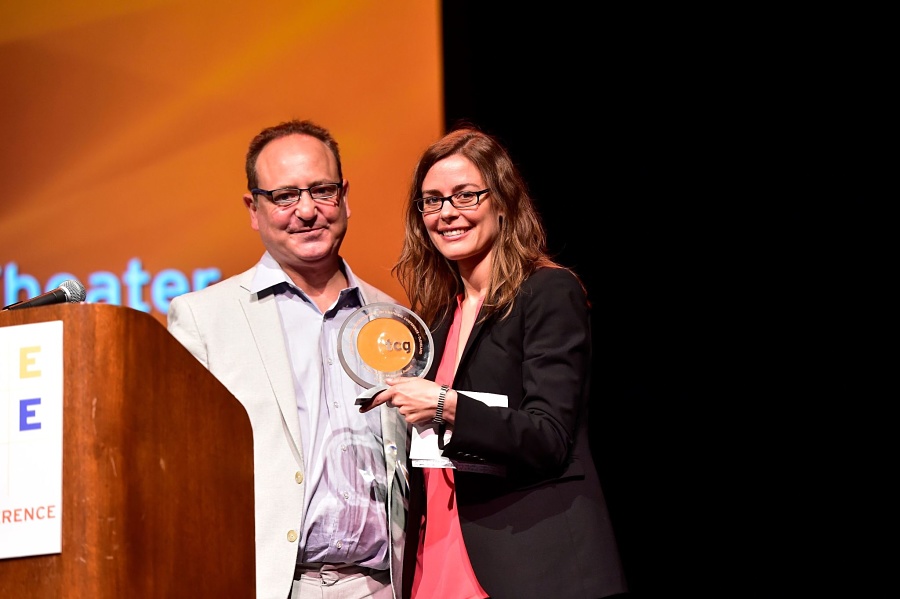
The Public was also the host for the keynote conversation, in which artistic director Oskar Eustis interviewed playwright/performer Lisa Kron (whom we’re now happy to call a two-time Tony winner, for the book and lyrics of Broadway’s Fun Home) about her career and writing process. Kron thought back and delved deep into the story of how her playwriting craft developed from performance art and cabaret acts with the East Village troupe Five Lesbian Brothers to shows like 2.5 Minute Ride and Well to the Broadway stage.
When she first came to New York after theatre school, Kron recalled seeing a Split Britches show in the late 1970s that was her “god play,” a term she attributed to Paula Vogel to describe “the play you see that changes your life.” What was about it that play? Eustis wondered. “It operated on a completely different paradigm,” Kron said. “I was from the Midwest and it was nonlinear. The theatrical imagination was so extravagant. And the point of view at the center was a female, lesbian, feminist point of view, speaking with authority.”
Recalling the impact of that show, Kron admitted that recent talk about the need for gender parity and diversity onstage, and the notion that “people need to hear their own stories,” didn’t quite sit well with her. “Actually, what we really want is people from all backgrounds telling the story of the world,” she said, “and not to assume that story of world gets told by the usual people who’ve always told it.”
At the WoW cafe in the 1980s, she and her colleagues threw a lot of plays onstage, and “a lot of them were hot messes, but there was always something that happened that was so incredible.There was an electricity between audience and what was happening onstage. It was cultured in the deepest sense, in that it was the place where we lived; it was how we lived our lives. Everything that happened to us was processed through the constant making of theatre in that space.” She traced the metatheatericality of later plays like Well, for instance, to “watching shows made by people who did not know how theatre was supposed to look.”
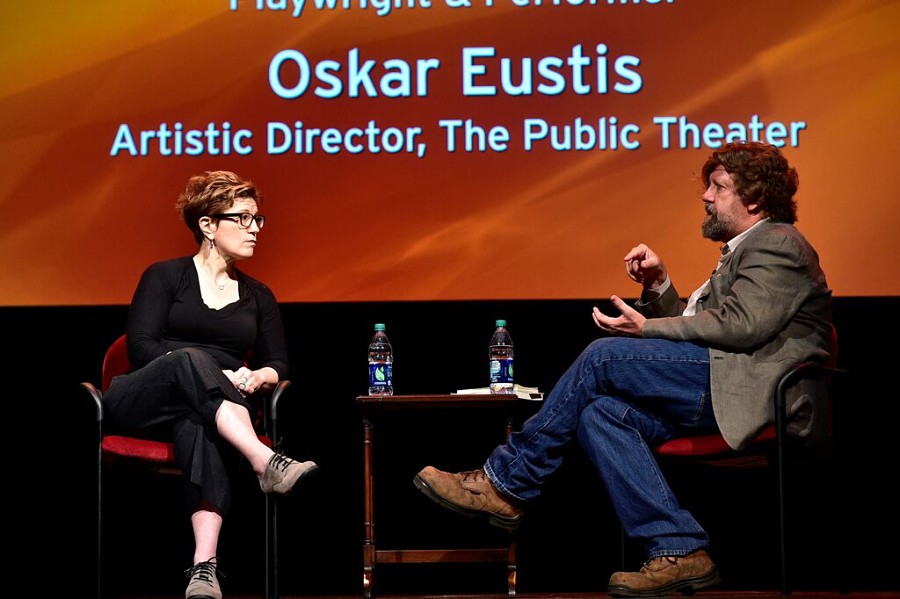
Eventually, Kron wanted to learn more about how theatre could work, and after creating a series of solo shows that interspersed songs and anecdotes and played at various clubs and small theatres in New York (“I trained like a vaudevillian,” she said), Kron realized that what she was seeking was the “dramatic action,” and that the real drama of a piece of theatre had to happen in the moment, in the space—it couldn’t be tidily tucked into the narrative.
“A lot of solo shows are very compelling and well done, and storytelling is obviously even older than theatre,” Kron said. “But I wanted to make theatre, and what that requires is dramatic action. What became clear to me is that if somebody is onstage telling a story, the dramatic action isn’t what’s in that story—the drama is that someone is telling you their story, and they need something to happen from telling it.”
Digging still deeper, she talked about another interest of hers (and ours), which is “what makes theatre different from other art forms.” After much thought and study, Kron said, she thinks it’s “limitation of consciousness. The play has to know more than any of your characters know. That’s what hooks us into a play. We can see what his Oedipus’s circumstance is, but if you were to ask him halfway through the play what his story is, he’d say, ‘I’m a guy who overcame a curse.’ But the play knows and we know better, and that’s what keeps us watching.”
Citing an insight from her partner, playwright Madeleine George, Kron talked about “the democracy of consciousness on a stage. We can see how every person on that stage, and everyone of us, can only see through our own consciousness; we think we know everything but we don’t. But in this collective experience, the group mind of a play—it’s like a trip to bridge that divide, that unsolvable human question. That’s why theatre is an exercise in ethics—it’s a form made of ethics.”
Bringing it full circle, Eustis linked Fun Home back to Kron’s realization with Split Britches’ world-building.
“My favorite quote from you was on the closing night of Fun Home at the Public,” Eustis recalled. “You said, ‘So many people have told me this is bigger than a lesbian show. But I think this is exactly the size of a lesbian show.’ Those characters are speaking for all of us. You watch people see that show who you know are homophobic, and they are weeping and they stand up at end. That’s when the game really changes.”
